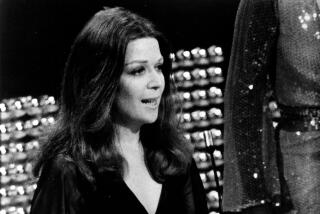‘Dream On’ Takes a Hit to Make a Point
- Share via
Most adults under 50, people who lived out their youth beneath the Woodstock glow of the ‘60s and ‘70s, probably have smoked marijuana at least once or twice; many in those rebellious, free-wheeling days did so regularly. Now, as parents grappling with rebellious teen-agers of their own, how do they justify their own past use while demanding that their children just say no?
Don’t ask TV. When prime-time entertainment programming acknowledges the existence of drugs at all, it’s usually to bludgeon viewers with the message that all drug use is evil and dangerous.
Sunday’s episode of HBO’s “Dream On” changes that in a big way.
For perhaps the first time in a television comedy, this episode shows two respectable adults smoking what is supposed to be a marijuana cigarette in a comedic, four-minute scene that is bound to play like deja vu for anyone who’s ever taken a couple of hits of that old demon weed and gotten silly.
“We’ve been kicking around this idea for a while, something that really speaks to a lot of people in our generation, who grew up in a time when there wasn’t the same stigma attached to drugs, and how they would reconcile that behavior with being parents today,” said David Crane, 34, co-creator of “Dream On.” “But if we were going to do it, we decided that we really wanted to go for it.”
“The show is about that whole ‘Do what I say, not what I do’ parental line, and we wanted to deal with it truthfully,” said John Landis, “Dream On’s” executive producer. “And it’s not like we’re talking about crack or heroin.”
But they are talking about something illegal, something that became taboo in the Nancy Reagan ‘80s.
“Considering that it’s perfectly acceptable to shoot people on television all the time, I can’t see why we shouldn’t deal with a relevant issue just because it’s illegal,” Landis added. “I think that the morals of this show are very strong. It’s very upfront about its condemnation of drugs and hypocrisy. We have a President now whose answer to the drug problem is to pretend that it doesn’t exist. That to me is irresponsible.”
Despite the fun the show has with the act of getting high, the episode is far more about parenting than it is about marijuana, more concerned with the dangers of hypocrisy than the dangers of smoking dope. But because of the normal constraints of television, the staff of “Dream On” at first contemplated ways of “soft-pedaling” the story.
They thought about telling it using alcohol and then they thought about creating the conflict around the father’s youthful experimentation with pot and his insistence that his son avoid even that. But in the end, Crane said, they decided that the most honest conflict and the funniest comedy would be derived from having the father smoke the joint he’d confiscated from his son’s sock drawer.
The father, Martin (Brian Benben), who hasn’t been stoned in 15 years, erupts when he finds the marijuana and tells his son (Chris Demetral) to “Just say no.” Later, Martin succumbs to pressure from a longtime pal (Dorien Wilson) and gets high for old time’s sake. Then, with Martin and his friend engaged in some very silly behavior under the influence, the son comes home and catches them in the act.
“That is an honest experience of getting high. It isn’t some ‘Reefer Madness’ nightmare. It can be fun,” Crane said when asked whether some viewers might conclude that--because of the comedic nature of the smoking scene--the show ultimately makes light of marijuana use. “But right on top of it, there are serious consequences. Martin ends up feeling like he’s the worst father on Earth, and that is certainly not worth any of the fun.”
HBO, the pay-cable network that has permitted nudity and profanity in “Dream On,” supported the episode wholeheartedly, the producers said. Bridget Potter, HBO’s senior vice president of original programming, said that she did not interfere because she endorses the show’s continual attempts to tackle serious parental issues in a mature fashion.
“We believe in the real world,” Potter said. “Our feeling is that as long as we are dealing with issues of being a parent with honesty and responsibility, we aren’t afraid of anyone who might get hysterical over it.”
Like many network sitcoms, the episode ends with a loving reconciliation between father and son. At the same time, however, it doesn’t try to suggest that children can be frightened or ordered or cajoled away from marijuana.
“The message of the show is to love and protect your children and try to behave as a responsible adult,” Landis said. But ultimately, the show contends, parents cannot control their children. The best they can do is talk openly with their teen-agers, express their fears about experimenting with drugs and try to guide the kids through their own good example.
“I think we all feel that the facile and unrealistic resolutions of family problems that are typical of network sitcoms are not necessarily in the best interest of families in America,” Potter said. “To tie it up with a pat resolution would have been completely dishonest.”
“In this age when the networks are wondering why viewers are looking elsewhere, the reason is that the sensibilities of ‘The Donna Reed Show’ from 30 years ago are the same as the sensibilities you see in ‘Full House,’ ” concluded Kevin Bright, “Dream On’s” other executive producer. “Television hasn’t changed, but we as a society have. We don’t buy that stuff anymore. And the more we start dealing with the vices in our society in an honest way, the more people will start watching again.”
More to Read
The complete guide to home viewing
Get Screen Gab for everything about the TV shows and streaming movies everyone’s talking about.
You may occasionally receive promotional content from the Los Angeles Times.






